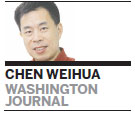
Concepcion Picciotto, the woman who protested against nuclear weapons in a camp across the street from the White House since 1981, died on Jan 25 in the N Street Village, a homeless shelter for women.
The New York Times described the 80-year-old woman as “President Barack Obama’s closest neighbor”. The two shared the same cause against nuclear proliferation. Obama won the 2009 Nobel Peace Prize largely for his call for a nuclear-free world.
So far, Obama has not commented on Picciotto’s passing. White House Press Secretary Josh Earnest said on Jan 27 that he didn’t know if Obama was aware of her death. Earnest praised Picciotto for her commitment to peace.
While the camp has been a constant presence across from the White House on 1600 Pennsylvania Avenue, there has been no report that any US president had ever spoken to Picciotto, who started her vigil in Ronald Reagan’s first year as president.
The reason could have been Picciotto’s opposition to Israel’s policies toward Palestine. Such a protest was politically risky for most US politicians in a nation where Israel is regarded as a close ally.
Picciotto was a familiar figure to Chinese who saw her over the decades. Videos on YouTube show Chinese tourists making donations to her cause and praising her as an exemplar of American democracy.
No one knows if Obama will acknowledge the non-proliferation cause that he and Picciotto advocated when world leaders gather at the Nuclear Security Summit in Washington at the end of March.
Obama’s progress in building a nuclear-free world has been disappointing compared with the high expectations people had when he took office in 2009.
Indeed, Obama should take some credit for concluding a nuclear deal with Iran, achieved in conjunction with other world powers including China, but he has not made any progress on the denuclearization of the Korean Peninsula.
It came as a surprise to many Chinese that right after the Democratic People’s Republic of Korea (DPRK) conducted its fourth nuclear test on Jan 6, US Secretary of State John Kerry quickly shifted the blame to China, saying China’s approach had not worked and “we cannot continue business as usual”.
Kerry pressured China to take stronger actions during his trip to Beijing last week, reportedly including cutting oil supply to North Korea, something Chinai immediately rejected.
China condemned North Korea’s nuclear test in the strongest terms, but many Chinese see the US as hardly doing anything conducive to resolving the issue.
The US has not addressed DPRK’s security concerns, such as the US’ habitual pursuit of regime change, should it abandon its nuclear program.
The US and its NATO allies toppled Libyan leader Muammar Gaddafi in 2011, only years after his country gave up its nuclear ambitions. That has not sent the right message to DPRK’s leaders.
The US has offered no good alternative this time, except calling for stronger sanctions. On Jan 27, Mark Toner, the deputy State Department spokesman, described sanctions as some of the most effective and potent tools.
But if sanctions were a silver bullet, the DPRK would not have conducted its fourth nuclear test, because it already is the most sanctioned nation on the planet. Over the decades, plenty of studies have proved that most sanctions have not worked.
A year ago, Obama admitted the comprehensive US blockade on Cuba that had been in place for half a century had been a failure.
Just as the huge suffering the US embargo inflicted on 11 million Cubans, sanctions targeting the lifelines of the DPRK will hurt 25 million people in the already poor nation, causing a possible humanitarian disaster that could destabilize the region.
The US has long believed that sanctions can bring a nation to its knees, but what has happened in the case of both Cuba and DPRK show the opposite is often true. Obama should be praised for improving ties with Cuba and Iran in the past year.
However, the US has so far refused to hold bilateral talks with the DPRK, a country with which it has no diplomatic relations. The US has been unwilling to resume Six-Party Talks without conditions attached, and its frequent military drills on the Korean Peninsula are hardly helpful to the situation.
As Obama calls for a nuclear-free world, the US itself plans to spend more than $1 trillion over the next 30 years to significantly upgrade its nuclear weapons capabilities.
It is not certain if Obama will be able to truly draw any inspiration in his last year in office from his formerly closest neighbor.
Contact the writer at chenweihua@chinadailyusa.com